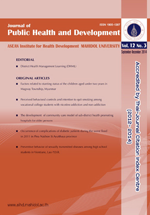Rabies Preventive behaviors of dog owners in Nakhon Pathom Province of Thailand
Main Article Content
Abstract
A cross-sectional study was conducted to investigate rabies preventive behavior of dog owners and related factors. Multi-stage cluster sampling was used to collect data in four health centers of Nakorn Pathom province, Thailand. Structured questionnaires were distributed to 319 dog owners in March 2012. Chi-square tests and multiple logistic regression were used to examine associations between independent variables and rabies preventive behavior.
The results showed that 38.5 % of respondents had good preventive behavior against rabies. Factors significantly associated with preventive behavior were knowledge (p-value = 0.004), perception (p-value = 0.003), dog carers (p-value = 0.008), number of dogs (p-value = 0.024), experience of bitten by a dog (p-value = 0.039), heard about rabies (p-value = 0.006) and accessibility to rabies information (p-value = 0.025). When adjusted for other factors, perceptions towards rabies was the strongest predictor of preventive behavior (odds ratio = 1.99, 95% CI;1.11 – 3.59). Dog owners who had positive perception about rabies prevention were about two times more likely to have good preventive behavior against rabies. The findings suggested that good knowledge and positive perceptions about rabies prevention should be promoted among dog owners and family members.





